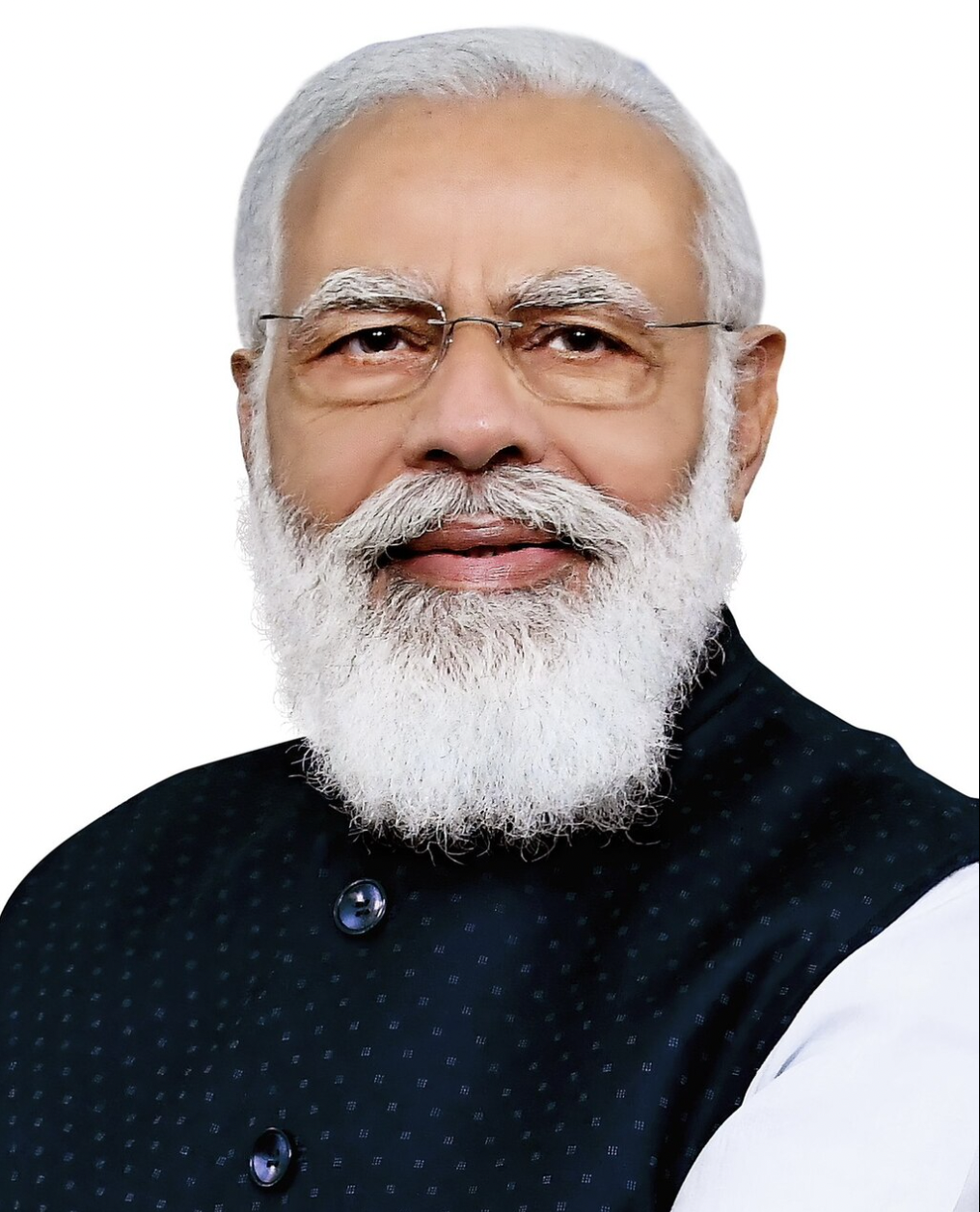
“We have experienced in the last 9-10 years that this is the period in which a new trust, a new hope and a new attraction has emerged all over the world towards India.
Narendra Modi, Independence Day Address, August 2023
"Modi's India is a more divisive and intolerant place, and its international reputation has suffered as a result."
"India's reputation as a beacon of democracy and secularism has taken a hit under Modi's leadership, with a rising tide of Hindu nationalism and attacks on minorities."
On the world stage, Indian Prime Minister Narendra Modi and the BJP claim to have significantly improved India’s geopolitical standing.
Indian media frequently repeat this claim, and it is amplified by a sophisticated digital propaganda machine. But is it true?
Indians are highly concerned with their country's global reputation, so whether or not Modi has succeeded in this regard is of great importance as India embarks on the largest election in history.
This research tests the prevailing narrative from several angles, presenting stark new polling results and a synthesis of recent research by international institutions including Pew, Carnegie, GlobeScan and YouGov.
PUBLIC OPINION RESEARCH
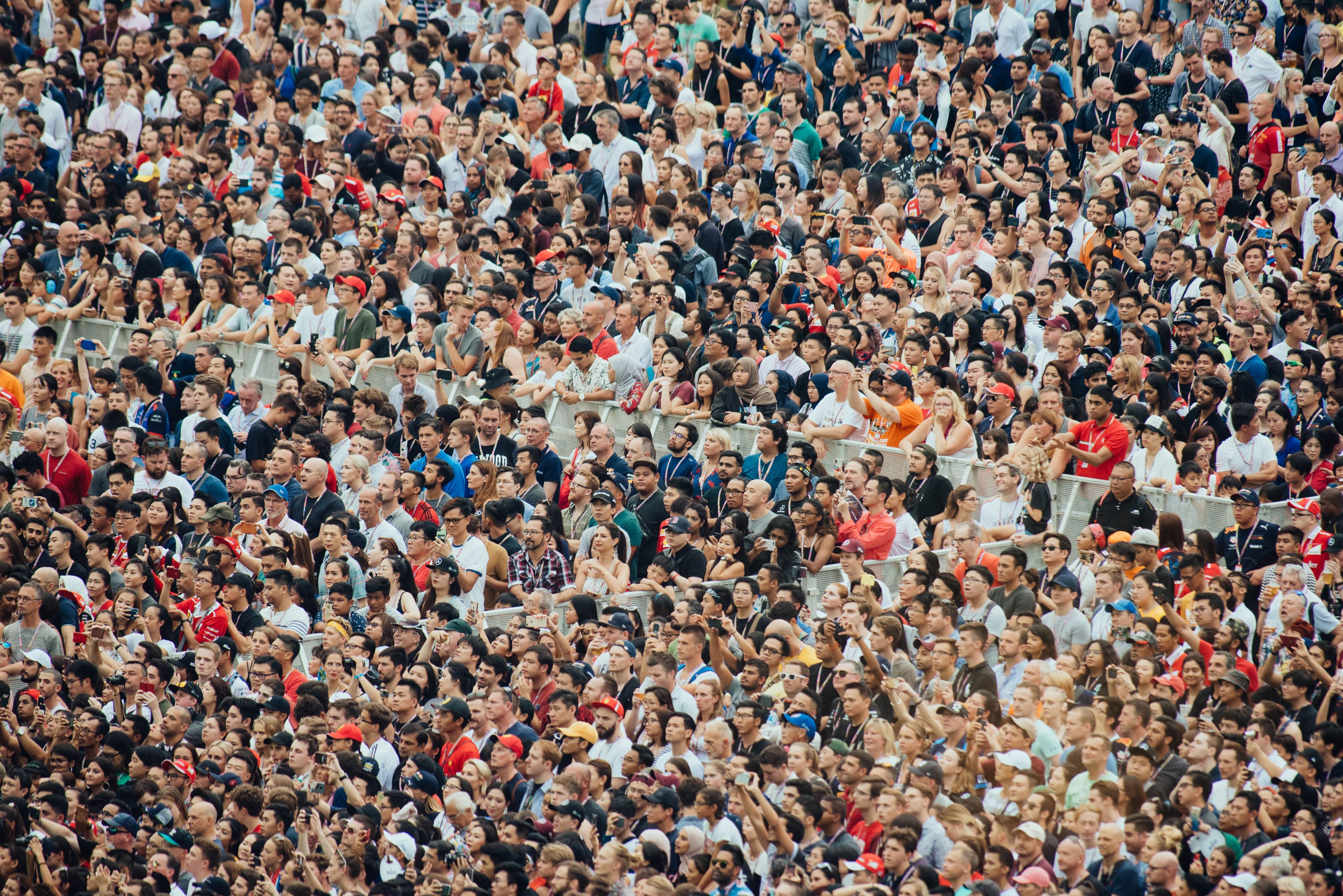
Polling conducted by the Pew Research Center in 2023 suggests that global audiences view India significantly less favourably under Modi than in the years before he came to power - especially in Europe.
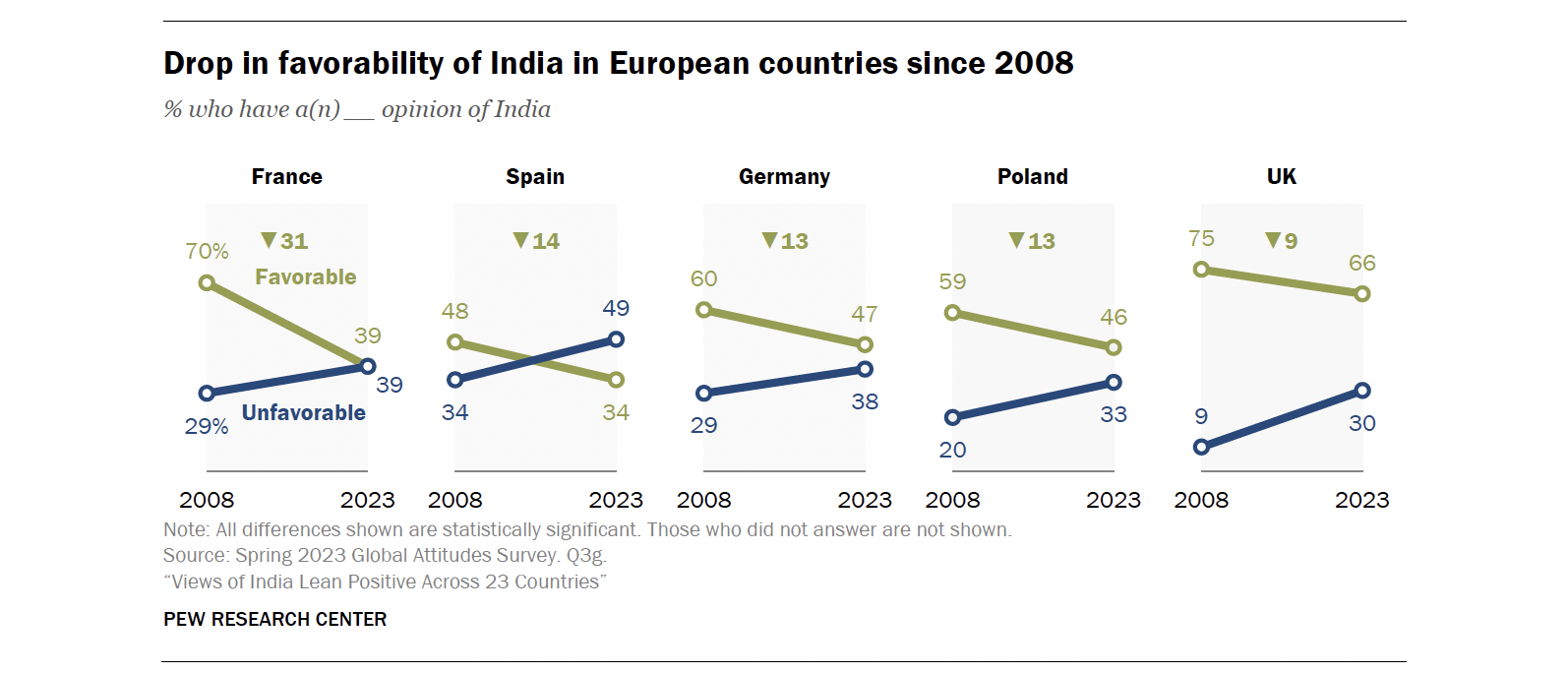
In addition, according to YouGov polling from March 2024 in both the US and UK, Modi is neither well known nor popular overseas.
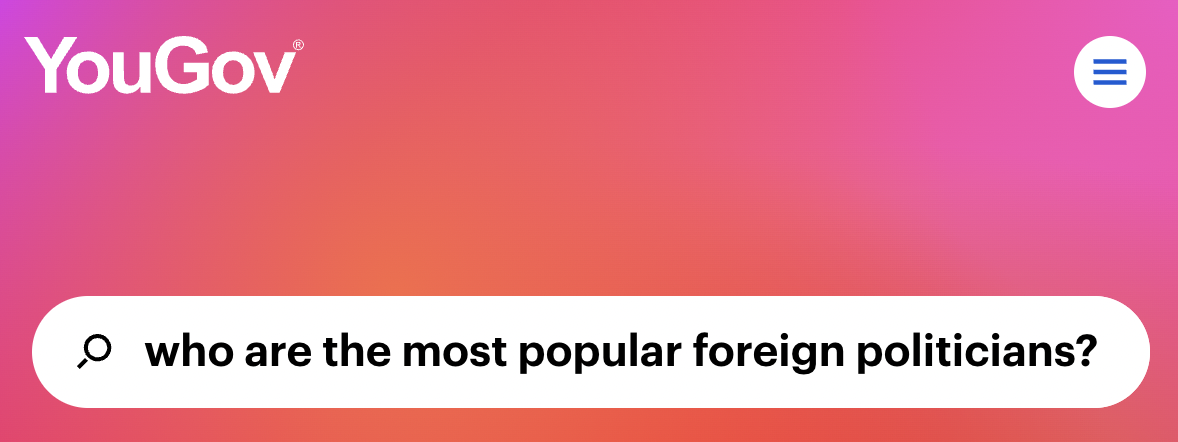
UK
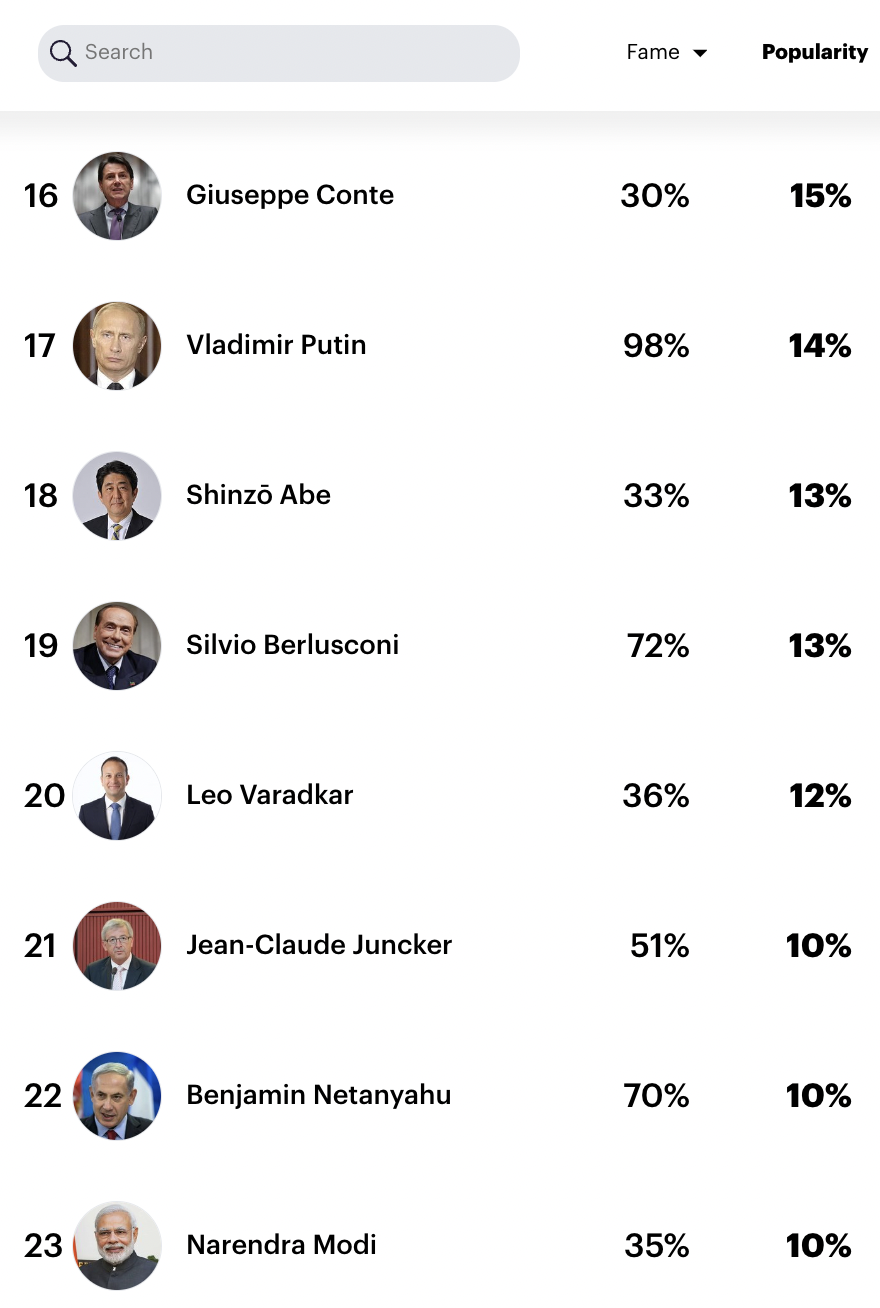
US
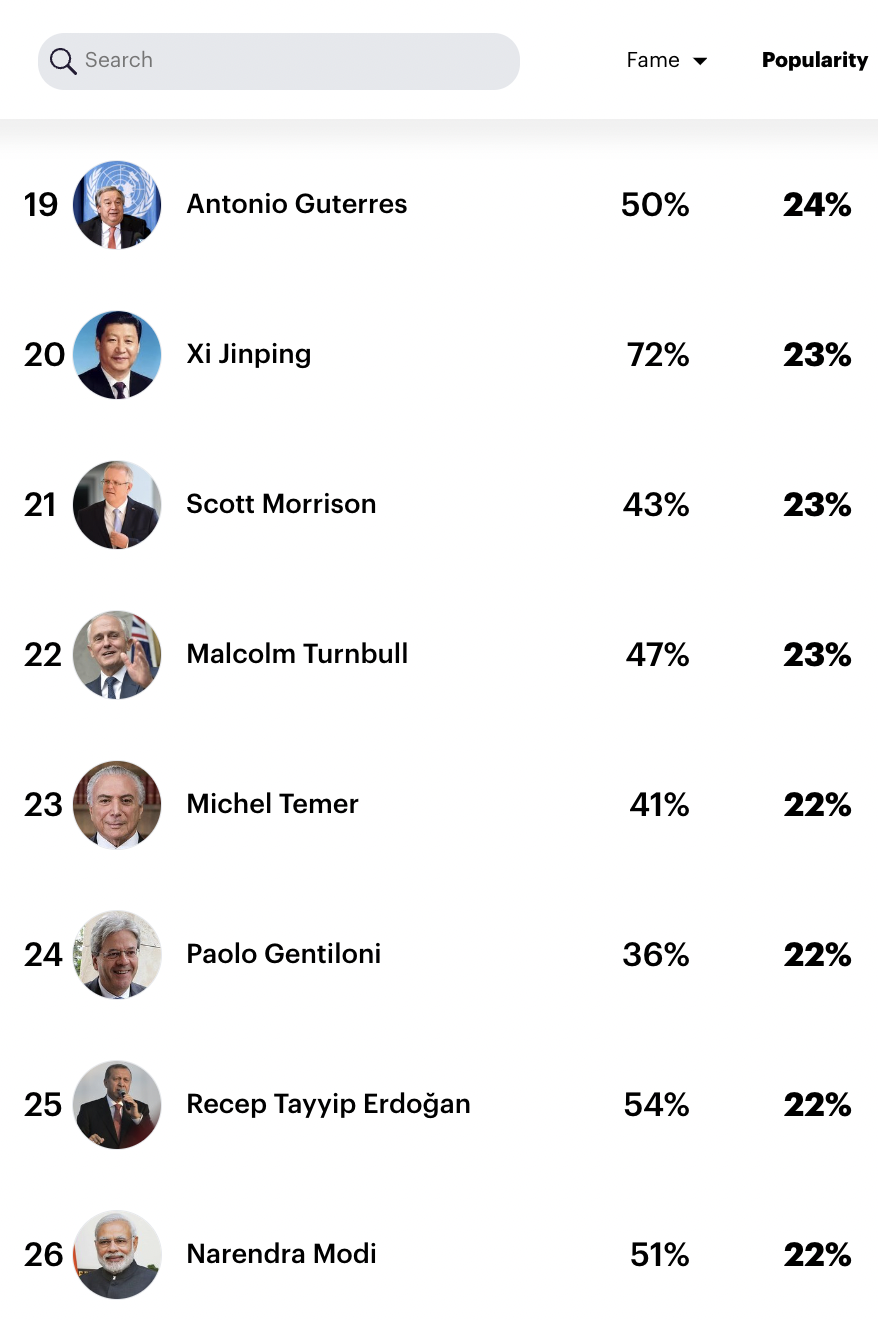
This polling shows that in the US and UK, Modi ranks below highly disliked figures such as Vladimir Putin and Xi Jinping, as well as lesser known former world leaders such as Brazil's Michael Temer, or Italy's Giuseppe Conte.
Indeed, many of have not heard of him at all. In the UK, only a third of people (35%) know who Modi is, and of those just 10 per cent view him favourably.
While half of Americans polled have heard of Modi and his favourability is somewhat higher at 22 per cent, he ranks 26th among world leaders in the US.
Meanwhile, new polling by GQR of British Indians also shows significant levels of disapproval and disillusionment in Modi's leadership.
- A majority (52%) of respondents hold an unfavourable view of Modi, compared to 35% who view him favourably.
- 54% of respondents think India is going in the wrong direction.
- Religious tensions and democratic restrictions weigh heavily among those unfavourable toward Modi, with 76% and 71% of respondents, respectively, deeming them very important.
- 65% of all respondents rate religious violence promoted by Modi spilling over to the UK as a top concern


So, what accounts for India's declining favourability and Modi's relatively poor global reputation? A new poll from GlobeScan offers insight.
New Poll - Global Trust and Perceptions of Modi's India
This poll presents fresh field research in the US, UK and France conducted by GlobeScan from 29 March to 8 April 2024. Please refer to the methodology at the end of this report for a full breakdown.
The results tell a very different story to Modi's claims of increased international trust in - and admiration for - India. In fact, the majority of people in the US, UK and France are concerned about the state of human rights and democracy in India. So much so that they overwhelmingly want to see these issues made conditions of new trade and political negotiations. Across all three countries:
89%
Think it is important that India protects human rights and democracy if their country is to strengthen ties with it.
88%
Support human rights being a condition of industrial and other commercial investments in India.
90%
Express concern at the Indian government’s alleged attempt to assassinate US and Canadian citizens on home soil.
3 in 4
Express concern over new laws which would make it harder for Muslims to become citizens in India.
84%
Think it is important their government advocates for human rights in India.
There is a virtual consensus among experts that concerns for India's democracy and human rights under Modi are well founded. V-Dem now classifies India as an "elected autocracy" and Freedom House has downgraded it to "partially free". Press freedom is ranked 161st in the world by Reporters without Borders.
State machinery is being misused to oppress the opposition, as evidenced by a wave of arrests, Enforcement Directorate raids, and investigations opened against opposition leaders, while BJP own leaders enjoy total impunity. Twitter, X, and Apple have all sounded the alarm at illegitimate government abuse of their platforms. The BJP explains these facts as the result of an international conspiracy, but polling conducted by YouGov for Friends of Democracy shows that 80% of Indians are concerned for the health of their democracy.
At the same time, international concern over BJP’s dismantling of India’s vibrant democracy and reducing it to electoral autocracy has risen sharply.
TIMELINE:
Global Media Coverage of Modi's India
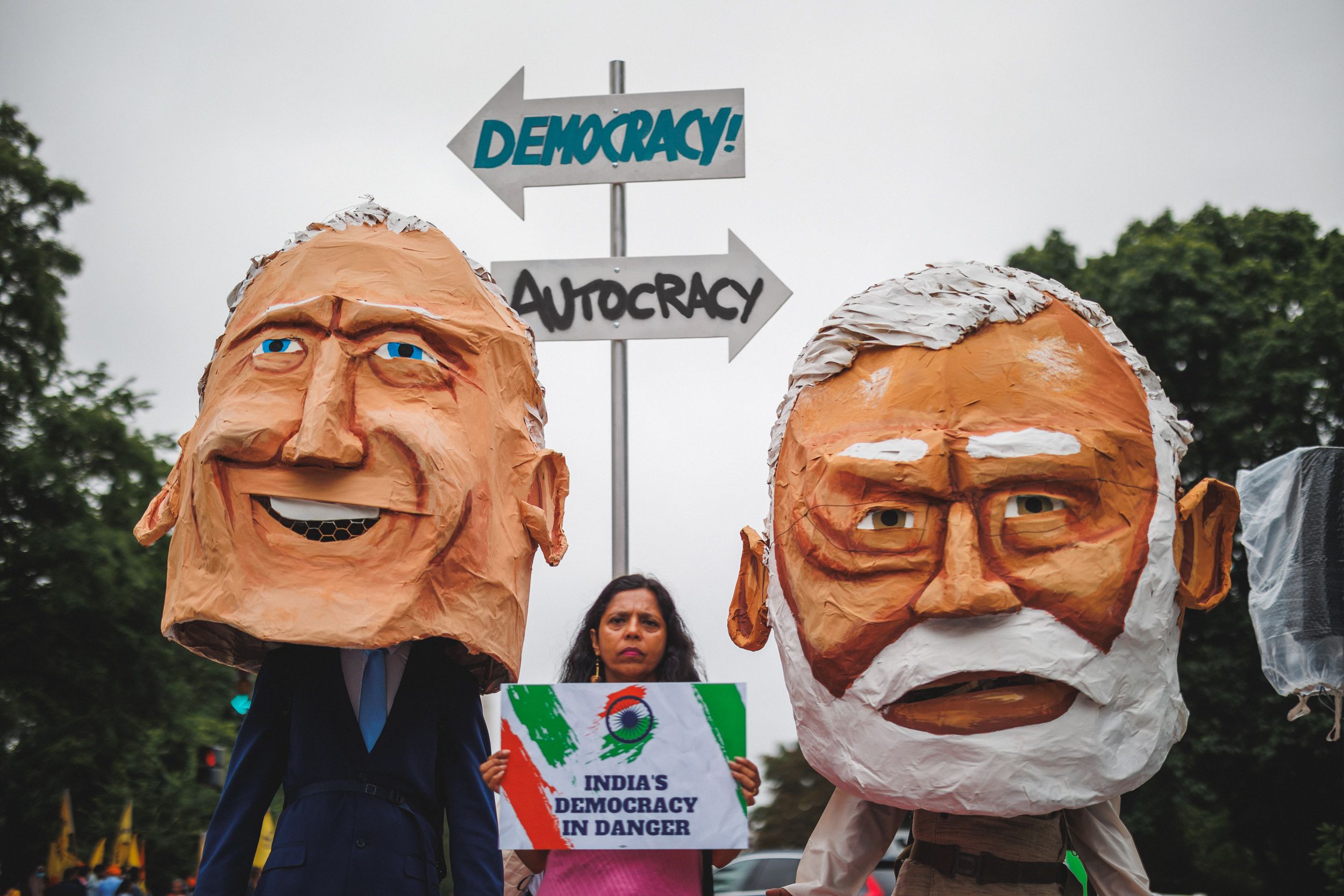

Feb 2023 - BBC Delhi offices raided weeks after the release of a documentary criticising the Prime Minister
May 2023 - India drops 11 places to 161st in Press Freedom Index
June 2023 - Modi's red carpet state visits to US and France marred by huge spike in criticism and protest on human rights and democracy.
June 2023 - 70 Members of US Congress write to President Biden expressing concern for India's democracy.
Sept 2023 - Modi repeatedly refuses Biden's requests for more media access at G20, in huge break with protocol.
Sept 2023: Justin Trudeau accuses India of killing Canadian Sikh.
Oct 2023: US indictment reveals that the Indian government ordered 4 assassinations of US and Canadian citizens, including in New York.
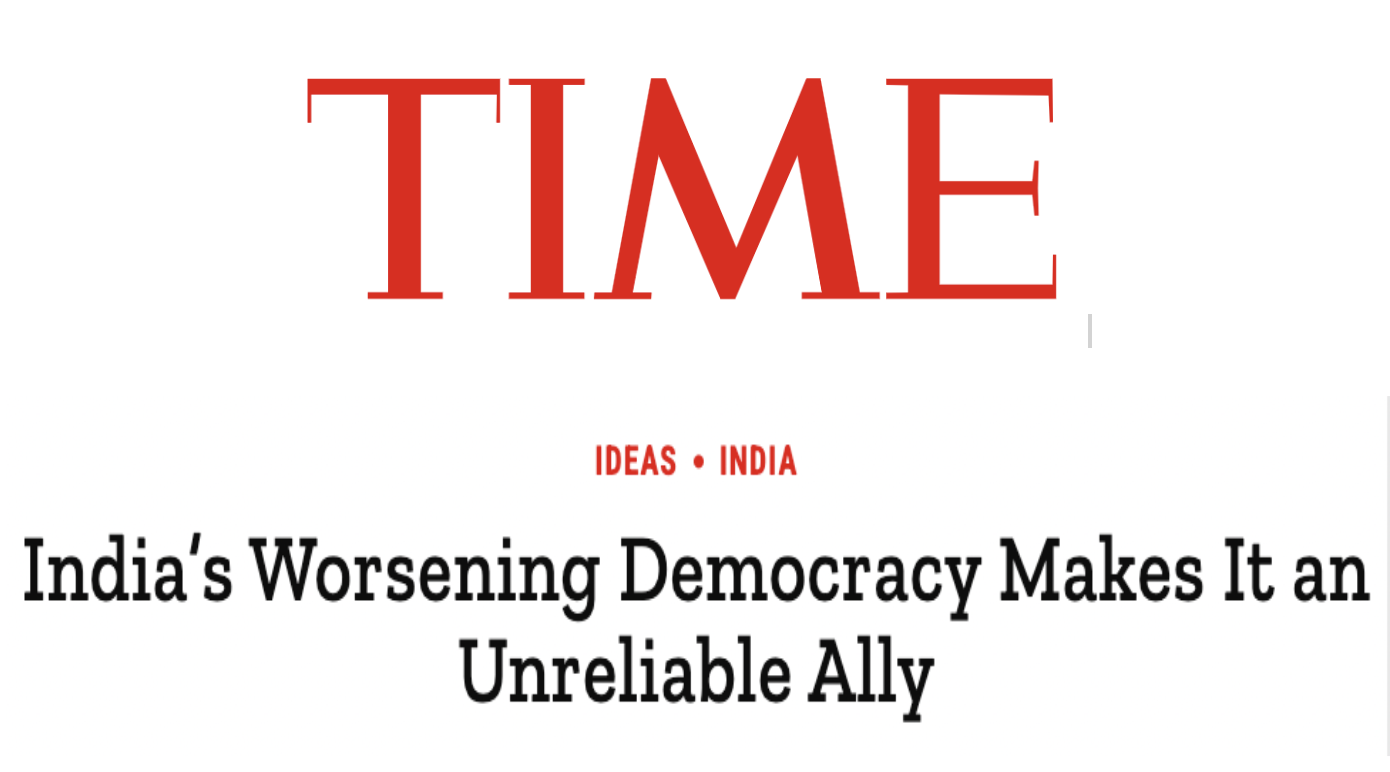
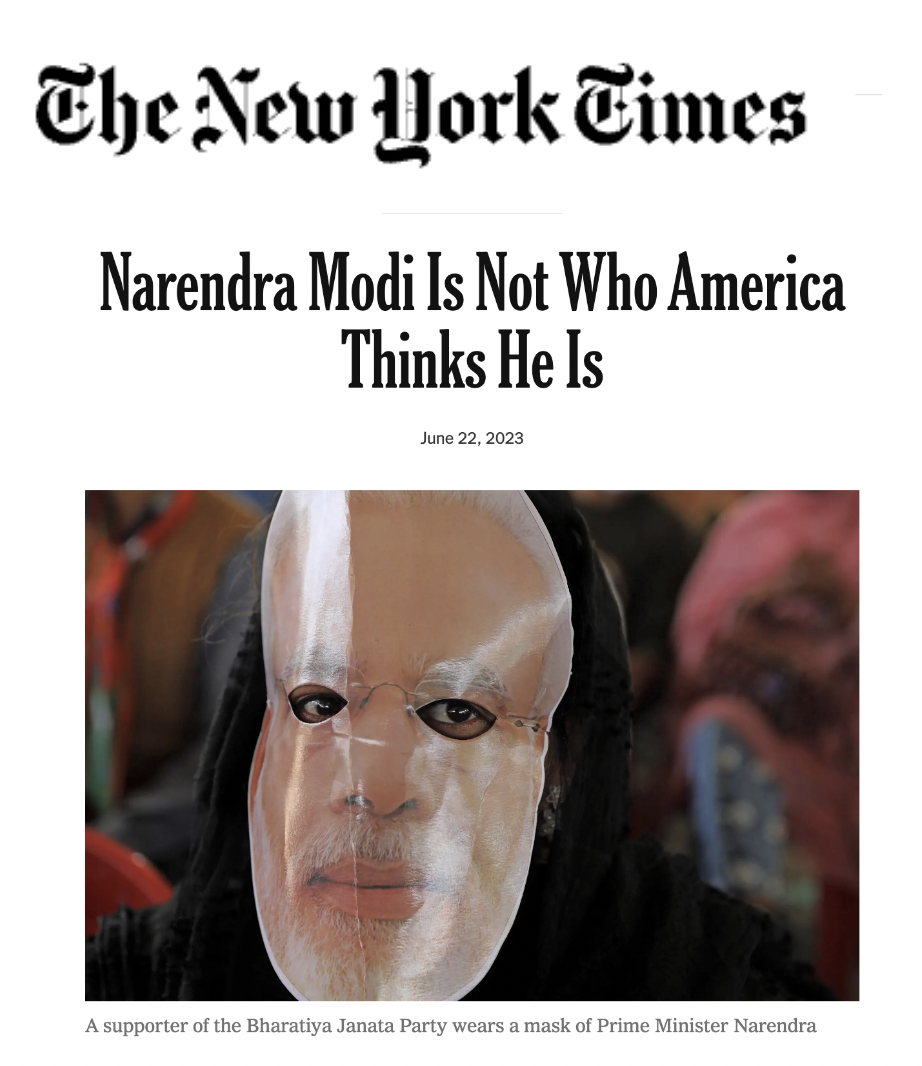
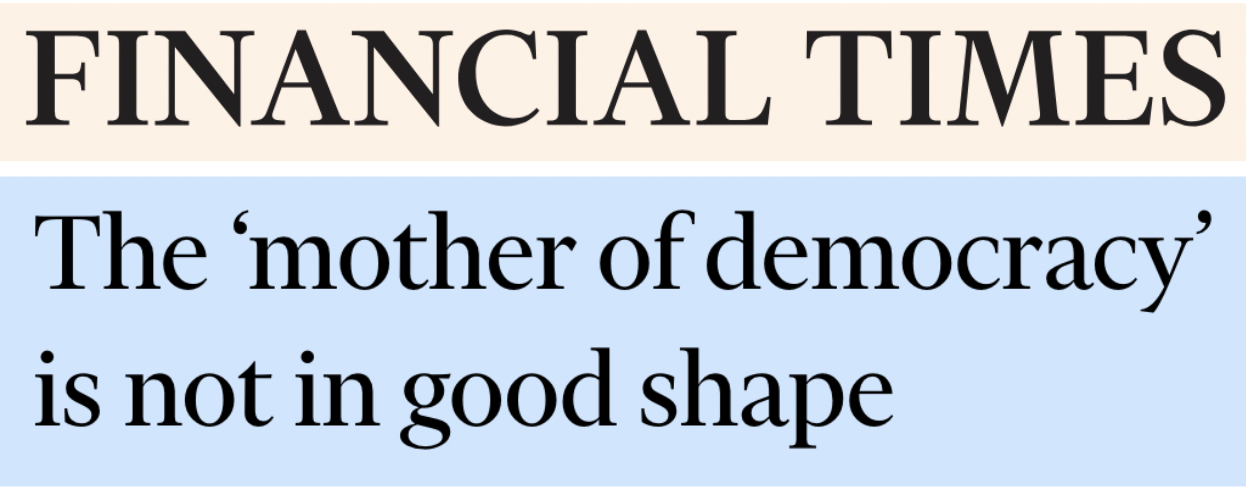
BACKSLIDING BY THE NUMBERS
Concerns About Indian Democracy Based in Hard Data
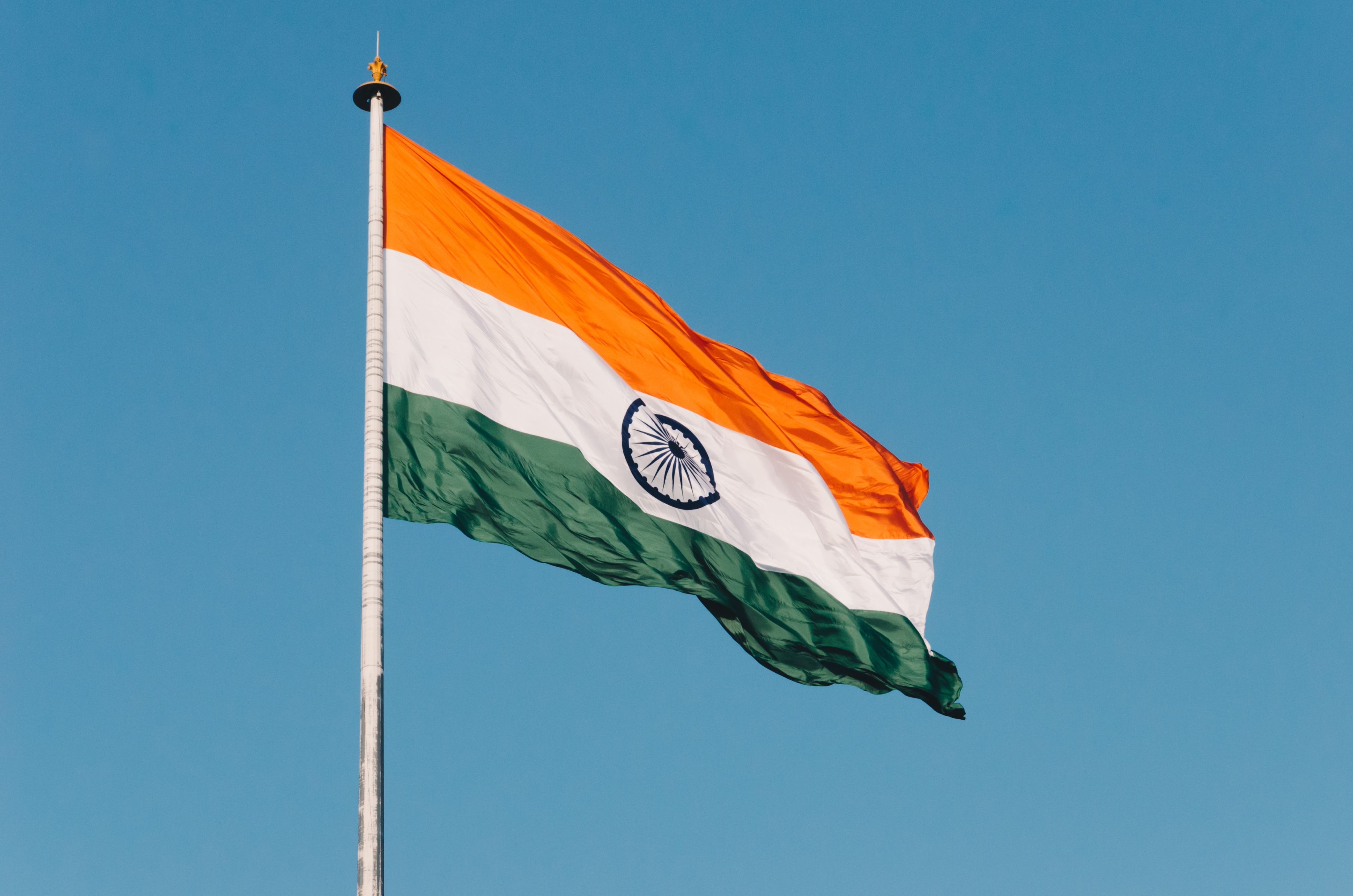
20
Companies now generate 70% of all profit in India, which also ranks 10th in the crony capitalism index.
6677
Civil society organisation licenses revoked under the Foreign Contributions Act in the last 5 years.
300%
Increase in hate crimes against minorities under the BJP.
554,034
People incarcerated in India in 2021. Three-quarters of them had not been tried.
10,000
The number of people arrested under the 50-year-old Unlawful Activities Prevention Act from 2014-20. 253 were convicted.
Why the Mirage?
If Modi has not in fact dramatically enhanced India's standing and respect on the world stage, what accounts for the widespread perception that he has? What creates the mirage?
The answer may be a combination of press censorship and coercion, and increasing levels of disinformation pushed out across social media.
Insiders report a close direction of the narratives of leading media outlets from the Prime Minister's office, with special attention paid to stories that portray Modi's role in international affairs. This direction may for a time have influenced global coverage as well, as media houses often took cues from their Delhi correspondents, who were influenced by the national media environment.
Experts have ranked disinformation as the number one risk to India, according to the latest World Economic Forum Global Risks Report.
The thesis that Modi has successfully deceived many about his accomplishments with the help of media coercion can be supported by looking at another key area of concern - the economy. Modi often speaks of reversing the economic "lost decade" before his premiership began in 2014. Yet figures from the World Bank and others suggest a far different picture. India is one of the fastest growing economies in the world, with genuine progress made in addressing poverty and inequality in the past 20 years. But the idea of a dramatic change in its economic fortunes under Modi bears little scrutiny, as demonstrated by the graph below.
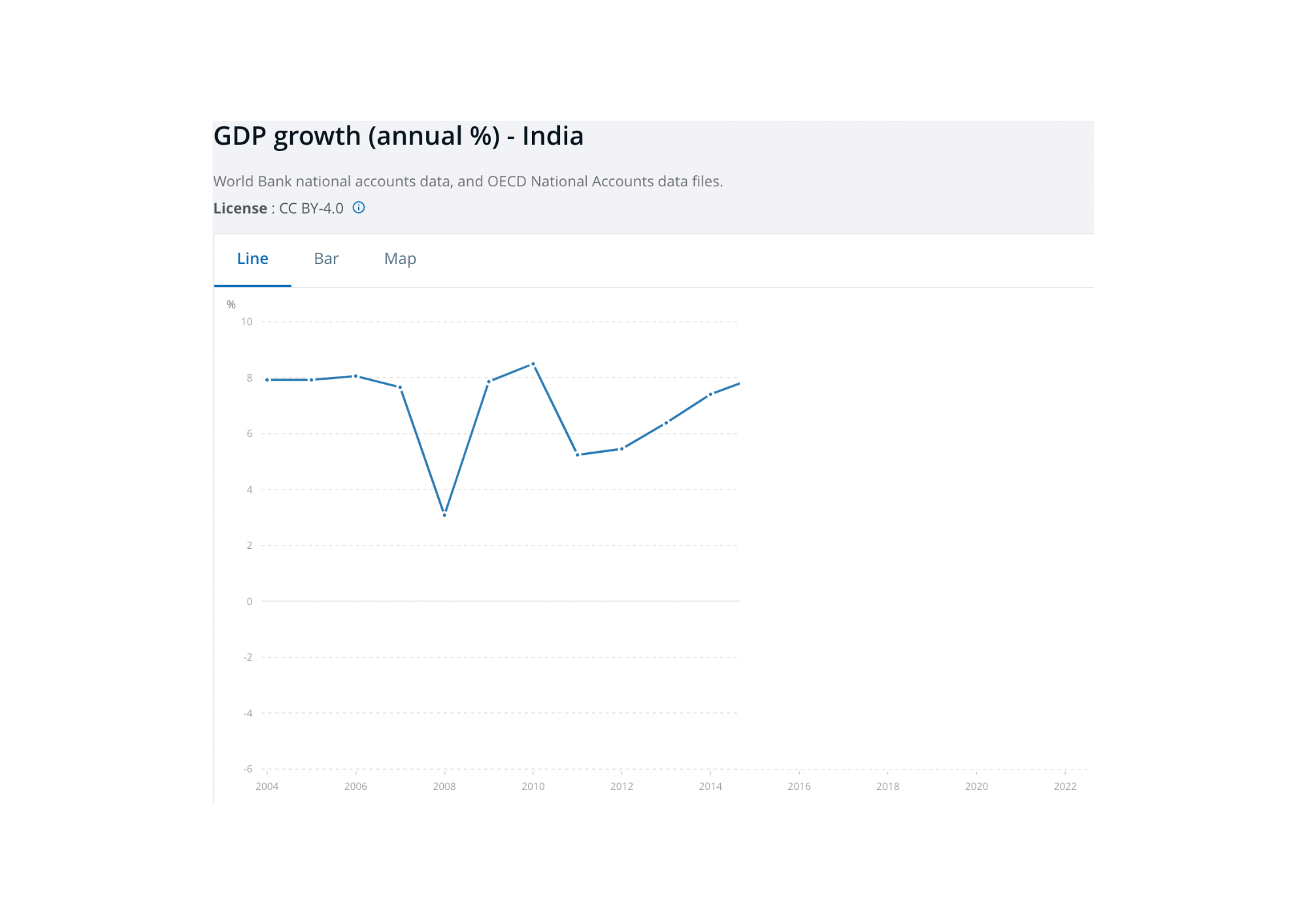
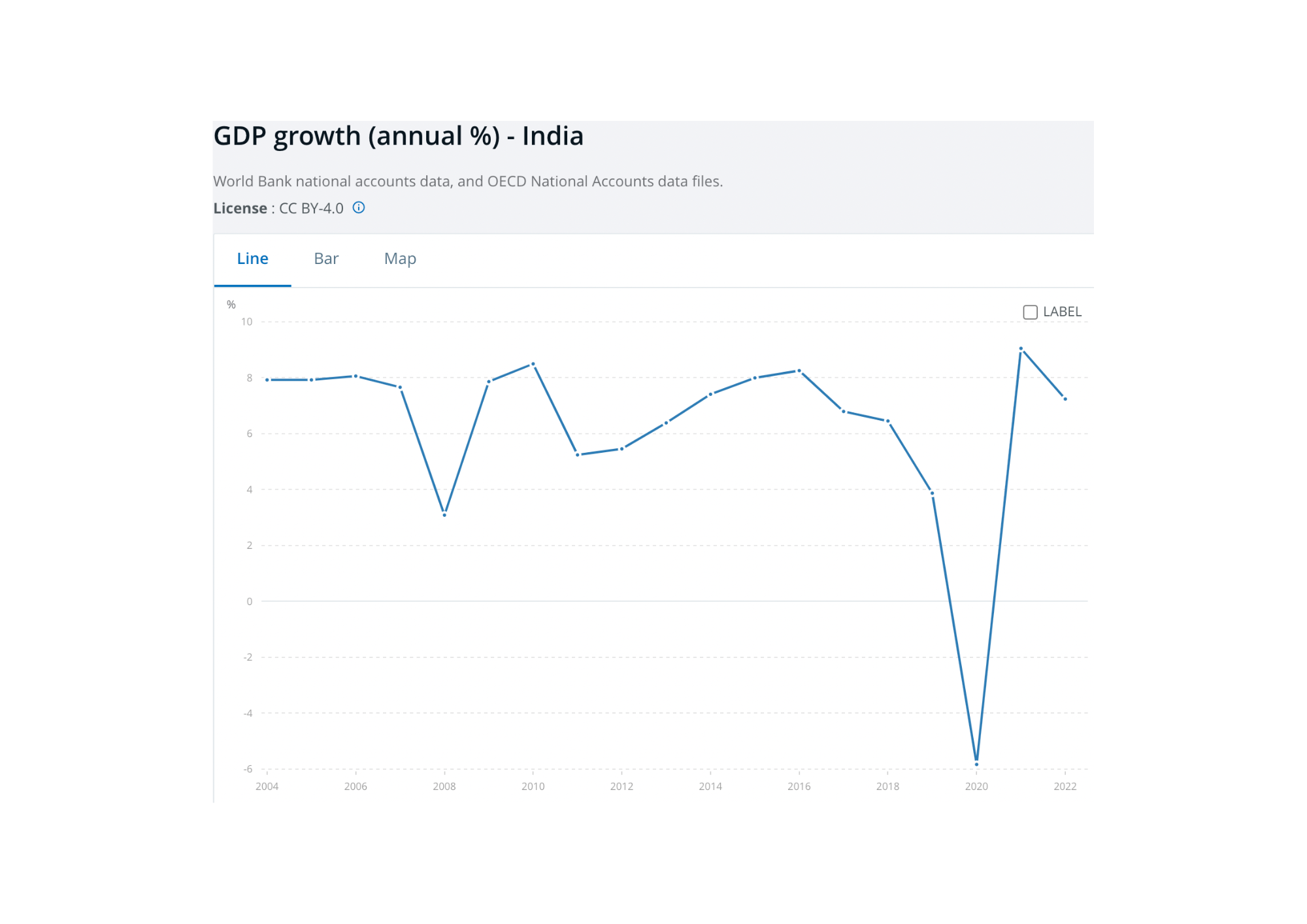
India's growth from 2004 until Modi came to power in May 2014...
... and after.
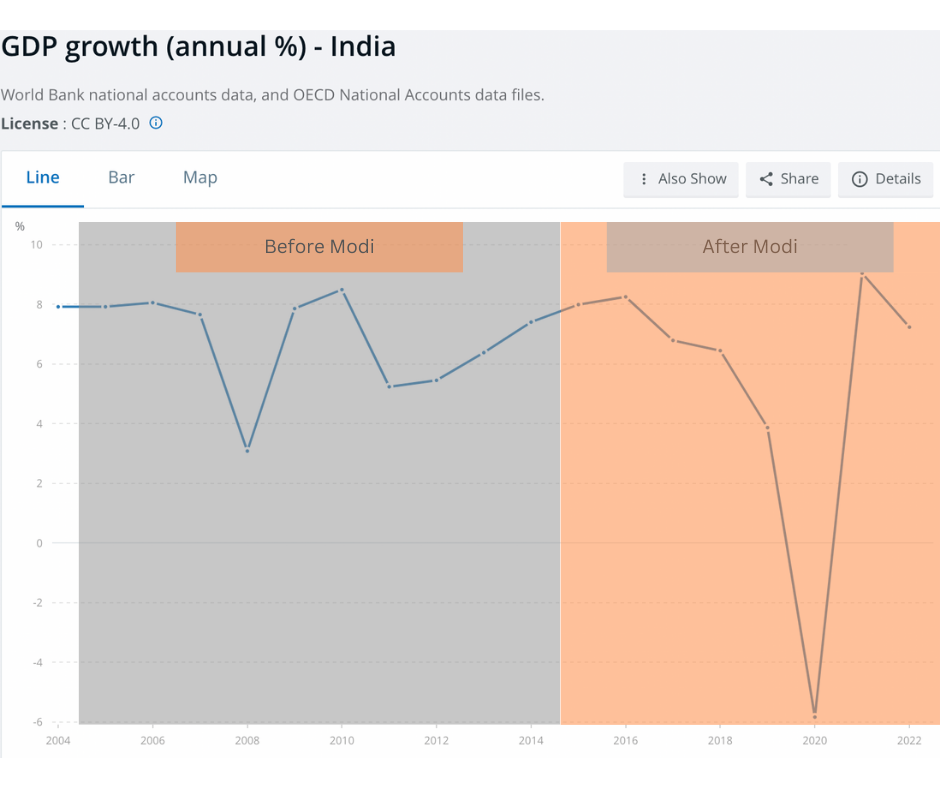
CONCLUSION
Overall, the evidence we have reviewed suggests that Modi’s claim of having dramatically enhanced India standing in the world is a mirage.
It also appears that India's level of domestic backsliding and repression may account for both the downturn in India's international reputation, and the mirage about it domestically. Indians may be suffering from a lack of press freedom, but international media is comparatively free.
While the evidence suggests India's political and economic influence is likely to continue increasing regardless, polling also indicates that its standing is likely to rise quicker if it changes course toward greater respect for human rights and democratic norms.
Hopefully all those involved, most of all Indian citizens, will benefit most from decisions made on the basis of reality and not illusion.
ADDITIONAL INFORMATION:
- This report has been co-authored by Professor Irfan Nooruddin from Georgetown University, US, Dr Sinha Subir from London University's School of Oriental and African Studies, UK, and Dr Ritumbra Manuvie from Groningen University, The Netherlands, in collaboration with not-for-profit Friends of Democracy. The GlobeScan research was commissioned by Friends of Democracy, which has no affiliation or relationship with the political action committee of the same name, founded by Jonathan Soros.
- Images/illustration selected from Unsplash and Midjourney.
METHODOLOGY
This briefing synthesises recent polling of relevant audiences from reputable international polling institutions including Pew, Carnegie, You Gov, and GQR.
It then presents fresh field research conducted by GlobeScan, conducted from 29 March to 8th April 2024. This comprised a 5-minute online survey of approximately 1,000 adults per country in France, the UK, and the USA.
The total sample was 3,000 adults. Using stratified sampling from managed online panels, samples are largely representative of the online population and weighted to the latest census data with the aim to be as nationally representative as possible.
fre
**88FreFRe

